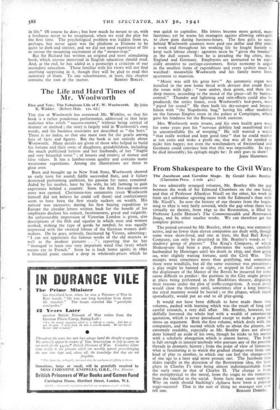The Life and Hard Times of Mr. Woolworth
Five and Ten ; The Fabulous Life of F. W. Woolworth. By John K. Winkler. (Robert Hale. I25. 6d.) THE rise of Woolworth has overawed Mr. Winkler, so that his book is a rather ponderous performance, addressed to that large audience who relish " success-stories," without being critical of manner or method ; the story is largely told in Woolworth's own words, and his business associates are described as " the boys." There is no index, so that one must root for the pearls among lists of facts and figures. But the book is not entirely about Woolworth. Many details are given of those who helped to build his fortune and their own; of daughters, grandchildren, including the much publicised heiress and her husbands; of her " fragile and very beautiful verse " ; of houses and estates; of money and false values. It has a lumber-room quality and contains many wearisome repetitions. Among the illustrations are three to gloat over.
Born and brought up in New York State, Woolworth showed an early taste for sound; fiddle succeeded flute, and it failure destroyed performing ambition, his passion for tunes remained. Aided by his mother, later by his wife, he left farming to gain experience behind a counter. Soon the first five-and-ten-cent store was opened. Christmas-tree ornaments (even Woolworth himself did not believe he could sell them) and confectionery seem to have been the first steady suckers on wealth. His naivete was excessive; during his first buying expedition to Europe the circular letters written back for the benefit of his employees disclose his conceit, facetiousness, greed and vulgarity. An unfavourable impression of Victorian London is given, also descriptions of the filth and squalor in which men and women worked, making the type of goods he needed; he was equally impressed with the sweated labour of the German women doll- makers. On he goes, artlessly, fascinated by Vienna, admitting: " I can not appreciate the famous works of the old masters as well as the modem pictures . ." ; reporting that he has " managed to learn one very important word Oui (wee) which means yes in French." Soon he is back home again; in 1893 a financial panic caused a drop in wholesale-prices which he was quick to capitalise. His letters become more genial, more facetious; yet he warns his managers against allowing sales-girls to chew gum during business-hours. The first girls to serve behind Woolworth counters were paid one dollar and fifty cent a week and throughout his working life he fought fiercely ti keep such labour cheap : agitators must be " given the bounce " in the dull season. Next he is invading the big cities, then England and Germany. Employees are instructed to be espe- cially attentive to carriage-customers. Strict economy is urged in the smallest items of expenditure and every cashier must be watched : meanwhile Woolworth and his family move from apartment to mansion.
" Music was still his great love." An automatic organ wa installed in the new home fitted with devices that could flood the room with light: " now amber, then green, and then into deep mauve, according to the mood of the piece—all by button- control." Thunder and lightning and rain-effects could also be produced; the entire house, even Woolworth's bed-posts, were " piped for sound." He then built his sky-scraper and became bitten with " the Napoleonic bug," having his office modelled on the famous Empire room in ,the palace at Compiegne, which gave his fondness for the Baroque fresh exercise.
Mrs. Woolworth went insane, and his own health gave way; for some years past his " nervous debility had manifested itself in uncontrollable fits of weeping." He still wanted a watch " that really worked and kept good time " that he could market at ten cents and make a profit on; that was all he needed to make him happy; not even the watchmakers of Switzerland and Germany could convince him that thii was impossible. In 1919 he died miserably; his epitaph might be : It only goes to show!
JOHN HAMPSON.






























 Previous page
Previous page